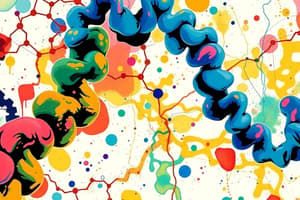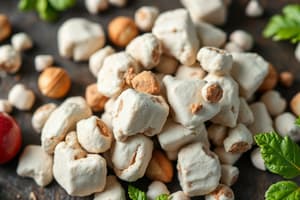Podcast
Questions and Answers
What are proteins composed of?
What are proteins composed of?
- Vitamins and minerals
- Amino acids (correct)
- Nucleic acids
- Fats and carbohydrates
What is the principal constituent of the organs and soft structures of the animal body?
What is the principal constituent of the organs and soft structures of the animal body?
- Minerals
- Proteins (correct)
- Fats
- Carbohydrates
What distinguishes the various proteins from a nutritional standpoint?
What distinguishes the various proteins from a nutritional standpoint?
- Physical properties
- Biological functions
- Molecular weight
- Amino acids makeup (correct)
What additional elements do proteins contain, apart from carbon, hydrogen, and oxygen?
What additional elements do proteins contain, apart from carbon, hydrogen, and oxygen?
What are amino acids?
What are amino acids?
Which of the following amino acids cannot be synthesized in the body at all or can only be synthesized in low amounts not sufficient to meet body requirements?
Which of the following amino acids cannot be synthesized in the body at all or can only be synthesized in low amounts not sufficient to meet body requirements?
For which animals are the 10 essential amino acids + glycine or serine and proline required in their diets?
For which animals are the 10 essential amino acids + glycine or serine and proline required in their diets?
Which type of amino acid is used metabolically in the synthesis of proteins?
Which type of amino acid is used metabolically in the synthesis of proteins?
Which amino acids are most likely to be deficient in rations when primary energy feeds such as corn are low in these amino acids?
Which amino acids are most likely to be deficient in rations when primary energy feeds such as corn are low in these amino acids?
Which category of amino acids forms about 44% of the body protein and can be synthesized in the animal body?
Which category of amino acids forms about 44% of the body protein and can be synthesized in the animal body?
Which type of protein contains all the essential amino acids in proper amount and proportion?
Which type of protein contains all the essential amino acids in proper amount and proportion?
Which proteins are considered to be of poor quality due to their lack of one or more essential amino acids?
Which proteins are considered to be of poor quality due to their lack of one or more essential amino acids?
What is the process by which intact dietary protein is broken down in the gastrointestinal tract?
What is the process by which intact dietary protein is broken down in the gastrointestinal tract?
Which part of the body is responsible for the synthesis of enzymes & hormones and the creation of an amino acid pool?
Which part of the body is responsible for the synthesis of enzymes & hormones and the creation of an amino acid pool?
What is the primary method of protein digestion in nonruminants?
What is the primary method of protein digestion in nonruminants?
What happens to the ingested oligopeptides in the intestines?
What happens to the ingested oligopeptides in the intestines?
Which type of feed is best for the rapid growth of ruminal microorganisms?
Which type of feed is best for the rapid growth of ruminal microorganisms?
What is the effect of high protein rations on the utilization of urea?
What is the effect of high protein rations on the utilization of urea?
What is the relationship between the fiber content in feed and protein digestibility?
What is the relationship between the fiber content in feed and protein digestibility?
What stimulates microbial growth according to the text?
What stimulates microbial growth according to the text?
Flashcards are hidden until you start studying
Study Notes
Proteins and Their Composition
- Proteins are composed of amino acids linked by peptide bonds.
- Principal constituents of organs and soft structures in the animal body include proteins.
- Nutritional differentiation of proteins is based on their amino acid composition.
Elements in Proteins
- Aside from carbon, hydrogen, and oxygen, proteins also contain nitrogen, sulfur, and sometimes phosphorus and iron.
Amino Acids
- Amino acids are organic compounds serving as the building blocks of proteins.
- Essential amino acids cannot be synthesized by the body or are synthesized in insufficient amounts to meet needs.
Essential Amino Acids
- In animal diets, ten essential amino acids, along with glycine or serine and proline, are crucial.
- These essential amino acids are necessary for all mammals and certain other animals.
Amino Acid Synthesis and Deficiency
- Metabolically, amino acids are used for protein synthesis.
- When primary energy feeds like corn are low, amino acids such as lysine and tryptophan are most likely to be deficient.
Categories of Amino Acids
- Approximately 44% of body protein comprises non-essential amino acids, which can be synthesized by the body.
- Complete proteins contain all essential amino acids in adequate amounts and proportions.
Protein Quality
- Incomplete proteins lack one or more essential amino acids, resulting in lower nutritional quality.
Protein Digestion Process
- Dietary proteins are broken down in the gastrointestinal tract through a process called proteolysis.
- The stomach and pancreas play key roles in this process by secreting enzymes.
Synthesis of Enzymes and Hormones
- The liver is responsible for the synthesis of enzymes, hormones, and creating an amino acid pool in the body.
Protein Digestion in Nonruminants
- Primary protein digestion in nonruminants occurs through enzymatic action in the stomach and small intestine.
Oligopeptide Processing
- Ingested oligopeptides are further degraded into amino acids in the intestines.
Feed Types and Microbial Growth
- High-quality feeds rich in fermentable carbohydrates support rapid growth of ruminal microorganisms.
Effects of High Protein Rations
- High protein rations can enhance the utilization of urea, improving nitrogen available for microbial protein synthesis.
Fiber and Protein Digestibility
- There is an inverse relationship between fiber content in feed and protein digestibility; higher fiber may lower digestibility.
Microbial Growth Stimulation
- The availability of energy sources, such as starch or sugars, stimulates microbial growth.
Studying That Suits You
Use AI to generate personalized quizzes and flashcards to suit your learning preferences.




